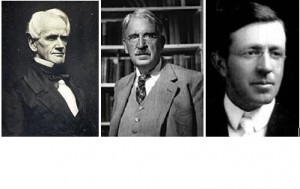Education Alternatives 102: Mann, Dewey & Lane
April 17th, 2010 at 19:49Following up on my recent“School Alternatives 101”post, I want to share some quotes from three great educational innovators who were “parents” (in this case, all “fathers”) of the three types of educational alternatives I talked about in my post. I want to focus on their visions’ of who drives the educational process, which I believe is a key way to distinguish these three approaches from each other. This may seem like “education-wonk” stuff to some of you, but I think it is really important, even from a parent’s point of view, when considering educational options for your and other kids.
The three innovators I am talking about are…
1. Horace Mann, the progenitor of the American public school system in the early 19th Century.
2. John Dewey, who set the philosophical basis of American secular/progressive/liberal education in the early 20th Century.
3. Homer Lane, a lesser know Briton and contemporary of Dewey, who was the mentor of A.S. Neill and the “free school” movement.
The inspiration for this post was an article by Ronald Swartz in the most recent Spring 2010 Education Revolution Magazine (which is edited by my friend and colleague Ron Miller). Swartz’s piece is titled “John Dewey and Homer Lane: The Odd Couple among Educational Theorists” and focuses on this issue of who drives the educational process. According to Swartz, “Dewey and Lane are the founding fathers of two distinct twentieth century educational reform movements.”
Dewey and Lane represent key “parents” to two of the educational alternatives, “holistic” and “free” schools that I talked about in my previous piece. To enhance and complete the comparison, I think it is useful to compare the ideas of these two to the words of Horace Mann, a Unitarian (like me), and an educational visionary who has had arguably more impact on the American
The three innovators I am talking about are…
1. Horace Mann, the progenitor of the American public school system in the early 19th Century.
2. John Dewey, who set the philosophical basis of American secular/progressive/liberal education in the early 20th Century.
3. Homer Lane, a lesser know Briton and contemporary of Dewey, who was the mentor of A.S. Neill and the “free school” movement.
The inspiration for this post was an article by Ronald Swartz in the most recent Spring 2010 Education Revolution Magazine (which is edited by my friend and colleague Ron Miller). Swartz’s piece is titled “John Dewey and Homer Lane: The Odd Couple among Educational Theorists” and focuses on this issue of who drives the educational process. According to Swartz, “Dewey and Lane are the founding fathers of two distinct twentieth century educational reform movements.”
Dewey and Lane represent key “parents” to two of the educational alternatives, “holistic” and “free” schools that I talked about in my previous piece. To enhance and complete the comparison, I think it is useful to compare the ideas of these two to the words of Horace Mann, a Unitarian (like me), and an educational visionary who has had arguably more impact on the American

